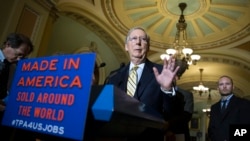U.S. President Barack Obama’s trade agenda scored a major victory Thursday when senators advanced a bill to facilitate approval of a massive 12-nation Pacific Rim free trade pact.
The Senate barely cleared a procedural hurdle when it voted 62-38 to end debate on Trade Promotion Authority (TPA), which subjects negotiated deals to simple-majority votes of approval or disapproval in Congress, with no amendments allowed.
The procedural vote all but assures final Senate passage of TPA, for which only a simple majority is required. That vote could come as early as Friday.
“I am very happy the Senate has decided to take another step forward on this very important initiative,” said Republican Majority leader Mitch McConnell moments after the vote concluded.
The president also commented, praising the move.
"I want to thank a bipartisan group of senators who took a big step forward this morning on a trade agenda that is consistent with strong labor standards, strong environmental standards, and open up access to markets," said Obama. "It's an agenda that’s good for U.S. businesses, but most importantly for American workers."
TPA, also known as “fast track”, would speed approval of the Trans-Pacific Partnership of nations that account for about 40 percent of global economic output.
TPA and TPP have overwhelming Republican support as well as the backing of a handful of pro-trade Democrats – a coalition that ultimately prevailed despite fierce efforts by opponents to block or delay the bill’s advancement.
Democratic Senator Sherrod Brown objected to ending debate before scores of proposed amendments to the legislation had been aired.
“We make decisions here that throw people out of work,” said Brown. “We are going to vote on this without even having amendments on how to take care of those workers and how to do trade enforcement. It simply does not make sense.”
McConnell and TPA’s author, Republican Senator Orrin Hatch, stressed that the chamber could vote on a series of amendments prior to the bill’s final passage.
“I’m willing to work with my colleagues to get us there,” said Hatch. “We need to get this bill passed. We need to pass it for the American workers who want good, high-paying jobs. We need to pass it for our farmers, ranchers, manufacturers, and entrepreneurs who need access to foreign markets in order to compete. We need to pass it to maintain our standing in the world.”
Votes on major trade issues often do not break down on strictly partisan lines. For example, Republican Senator Jeff Sessions voted against advancing TPA, arguing that Congress should not surrender its right to amend trade deals, and that previous pacts have led to net job losses in America.
“As in the past, it appears this agreement will reduce jobs, and reduce wages, too. And reduce manufacturing. We cannot be a strong nation without a manufacturing sector,” said Sessions.
Should it pass the Senate, TPA would need to be approved by the House of Representatives before President Obama could sign it into law.
The president faces considerable opposition from members of his own party in the House, where Democrats also say they're concerned about labor conditions for workers in some of the Pacific nations.
The bill grants “fast track” powers for a six-year period, meaning the president’s successor would also have use of the tool.




